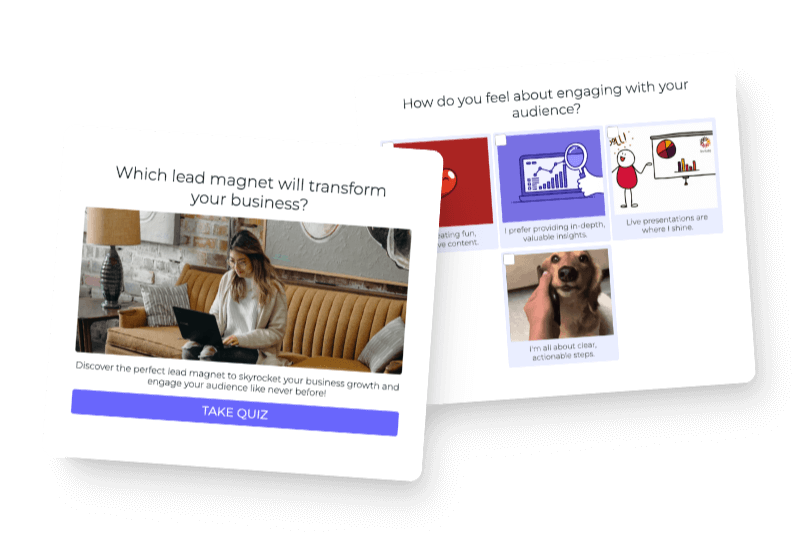You can learn how to do almost anything with the internet.
Do you want to learn how to cook a turkey? Check out a food blog. Want to pick up Spanish again? Sign up for online tutoring. Ready to improve your mental health? Hire an online coach.
Education is now at the tip of our fingers, and it’s all thanks to edupreneurship. As an edupreneur, you can sell knowledge products (AKA your expertise) online and grow a business with just a laptop!
In this guide, I’ll teach you everything about edupreneurship, including:
- What is an edupreneur?
- 5 edupreneurs and how they succeed
- 6 types of edupreneur jobs
- How much do edupreneurs make?
- Leaving your job for the edupreneur life
- How to become an edupreneur
Let’s get started!
What is an edupreneur?
An edupreneur is someone who makes a living selling online courses or coaching services, based on their expertise. In other words, they exchange their knowledge online for money.

How are edupreneurs different from entrepreneurs?
Entrepreneurs can invent any type of product, while edupreneurs stick to “knowledge products,” or products based on their knowledge.
For example, Matt and Josh founded Interact, which makes lead generation quiz software. They are entrepreneurs.
Elna Cain, a freelance writer, uses her expertise to teach others how to build a freelance writing business. She uses the knowledge she learned from freelance writing herself to impact clients. She is an edupreneur.

So, what’s so great about becoming an edupreneur? Why should you become one?
Two reasons.
Reason one: Edupreneurship can take away the hustle and burnout from your life.
Paul Fishman, a self-love coach, described his life prior to coaching: “I was a personal trainer, nutrition coach, spin instructor, pilates instructor, and I was running around like a chicken with its head cut off. It was just constant movement and hustle that really burnt me out. I was doing that for nearly five years.”
Edupreneurs can choose their business hours, client workload, and vacation time. It’s harder to burn out when you’re the boss.
Reason two: Edupreneurs share their innate gifts. They get to do something they’re naturally good at and make money from it!
Kelly Trach coaches others to find their “genius” and build a business from it. “When you’re doing your genius, people notice and heads turn because it’s this magnet that pulls people in. It’s somebody showing up as their authentic core essence.”
So, what does sharing your innate gift look like?

Jacques Hopkins lives out his passion and teaches piano to adults. He could’ve stayed at his previous software development job. But his gift lies in the keys—he’s meant to spread his piano “genius” to others.
You might be thinking, Selling knowledge online sounds great and all, but it seems unrealistic. How could I drop my current job to live out my passion?
The whole “Do what you love!” advice was looked down upon for decades—success meant becoming a doctor, financial person, or lawyer.
But the internet changed this phenomenon.
Now you can follow people from across the globe and learn anything from coding to a new language online. With a smartphone, education is in the palm of your hand. You don’t need to go to a classroom.
And yes, you can do what you love and live comfortably off the profits.
Let me introduce you to five successful edupreneurs.
5 edupreneur examples and how they succeed
In our Creator Stories podcast, we are enlightened every week with edupreneurs from across the board. Below are five online creators you can learn from.
1. Paul Fishman—Physical trainer to self-love coach
Previously a physical trainer, Paul Fishman teaches his students to reach their full potential by doing what’s most important—loving themselves unconditionally.
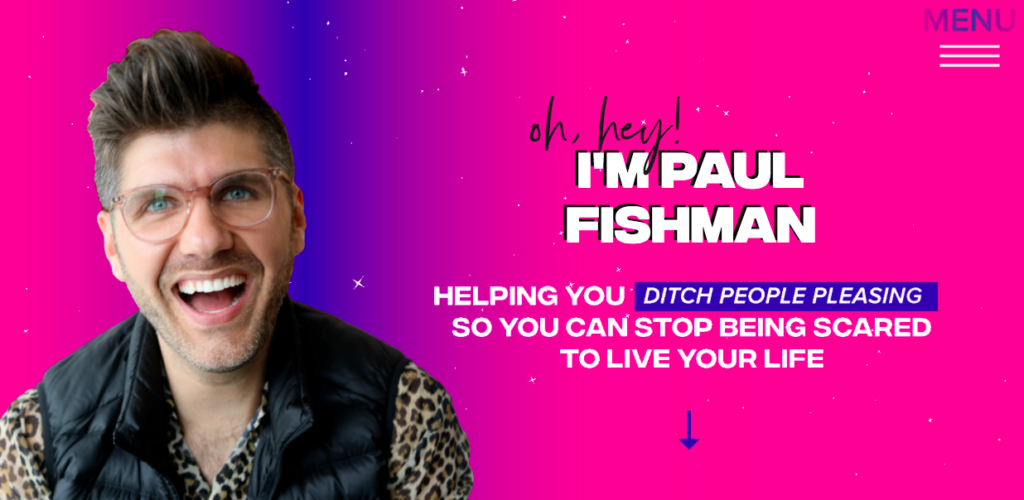
When Paul was a physical trainer, he heard his clients say things like, As soon as I lose weight, my boyfriend will love me or People will accept me when I’m skinny.
This self-criticism drove Paul to dig deeper into his work. “I needed to get underneath the ‘why’ behind the weight loss or the working out or the getting better eating habits, and then get people to do it for themselves first.”
Instead of training people to look better on the outside, Paul turned the process inward to self-love. This makes his program stand out in the market. Once you love yourself unconditionally, your body goals will come through.
Paul serves his clients with 1:1 coaching, online courses, and a “self-love” clothing brand. His Interact quiz, “Will journaling, meditation, or mantras work best for you?” generates leads to his biz.

Oh, and did I mention he’s making 8x more than he did at his previous job?
Listen to Paul’s podcast episode here.
2. Mai-kee Tsang—Health coaching to podcast strategist
If you were known as the “quiet girl/guy,” then you will love Mai-Kee Tsang’s mission.

Mai-kee was a shy girl who answered “I don’t know” every time someone asked, “What do you want to do when you’re older?”
She didn’t figure it out until university, when she went through a self-healing transformation and came across coaching. “During my final year of university, I studied health coaching on the side, and I graduated the same year as I did with my coaching certification. I was going down this entrepreneurial coaching route.”
Mai-kee wanted to build a platform for quiet women like herself, to help them be “heard and amplified.”
Like many of you, coaching came naturally for Mai-kee—but the business side of things didn’t. So, Mai-kee learned the ropes of online marketing and joined an internship.
Now Mai-kee “amplifies people’s voices through sustainable visible work and podcast guesting strategy.” Can you think of anyone else who helps women build podcasting businesses? I’ll wait.
Mai-Kee shares her mission with a mentorship program and 1:1 VIP program. She went from earning $10,000 a year to almost $100,000 a year. Now that’s progress.
You can listen to Mai-Kee’s podcast episode here.
3. Kaye Putnam—Corporate to Brand strategist
You’ve probably seen Kaye Putnam around the Interact blog. She’s known as a brand strategist who generated $100k from her brand strategy quiz. But Kaye is also an edupreneur veteran—her business started in 2008.

Kaye grew up with a strong entrepreneurial spirit. In high school, she grew a photography business to six figures. But after graduating college with a marketing and psychology degree, she said hello to the corporate world.
Kaye’s 9-to-5 was going great until she married her military husband, which meant frequently moving around the United States. “I just got so burnt out going on interview after interview, trying to land a corporate job every time we moved. Finally, I realized that I could go back to entrepreneurship, but this time do it online so that it was location-independent.”
Kaye used her expertise in psychology and marketing to build a brand strategy biz. She went from building brand packages to online course creation.

What’s interesting about Kaye is that she already had a career under her belt when she found edupreneurship. People of all ages and backgrounds can start a business… it’s never too late!
Oh, and she currently makes 12x more than she did at her corporate job.
Listen to Kaye’s podcast episode here.
4. Stephanie Shaw—Health scare to wellness coach
Before Stephanie became a wellness coach, she worked for non-profit organizations and ran a food blog.

Her career transition began a few years ago, when she experienced stroke symptoms and didn’t know why.
Stephanie visited multiple doctors and health specialists, but nobody could tell her what was wrong. It wasn’t until she found a Naturopath doctor that she FINALLY identified the issue.
This experience pushed Stephanie to become a wellness coach. “I know how helpless I felt during that time; it was hard for me to go to work, hard for me to see, just all the pain that I was in, and that’s why I decided I needed to help other women and other people feel better faster.”
And that’s what Stephanie does now. She offers holistic coaching to improve women’s health so they don’t have to go through what she did.
Helping others is the foundation of edupreneurship. When you go through a dark period, your initial reaction is to prevent others from going through the same thing. Like Stephanie, you might do this with online coaching.
You can listen to Stephanie’s podcast episode here.
5. Kelly Trach—From tech startups to business coach
Kelly Trach’s is a classic edupreneur story. After starting and failing three startups, Kelly moved on to what she was made to do—business coaching and writing.
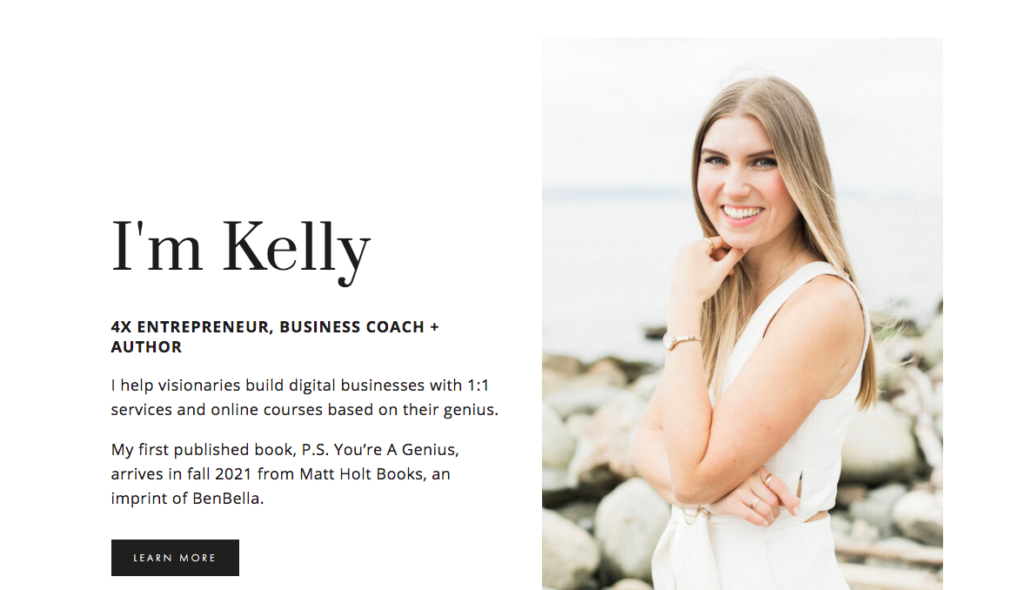
After college, Kelly moved to San Francisco with the dream to build a startup. It took three tries to realize she wasn’t following her “genius.”
“I was looking out at the lake, and the sun was streaming through in the morning. And I heard this phrase from my intuition, and it was a phrase I had never heard before: What if you just did what you were good at? So I thought to myself, Okay, I’ve literally tried to pursue these really hard things. What if I try to do something I’m good at? And my only options were to try to find another job or start another business.”
Kelly uses her prior business experience to help her clients build digital businesses based on their “genius,” or innate gift. But it didn’t start out that way.
She began her self-discovery journey with a health blog, which turned into mindset/life coaching, and then finally business coaching. Edupreneurship isn’t a linear path. You might start as one thing and end up in another world!
And if you’ve ever thought, I won’t be successful until I have over 10,000 loyal subscribers, then Kelly is your go-to example of beating the odds. She manages a six-figure business with fewer than 3,000 social media followers and subscribers. Oh, and she’s releasing a book at the end of the year.
Kelly also uses a “What’s your genius” quiz to attract customers to her 1:1 services, mentorship program, and membership.

Once users find their “genius,” they can sign up for Kelly’s services to continue their journey.
You can listen to Kelly’s podcast episode here.
Takeaways from these 5 edupreneurs
Aren’t these edupreneurs inspiring? Below are three takeaways you can use for your knowledge commerce biz.
1. Find your unique selling point
The secret to standing out online is finding your unique selling point (USP). Your USP teaches users something nobody else can.
Mai-kee’s USP is providing a platform for women who are quiet. She targets a specific audience (shy, female entrepreneurs) and teaches them to grow their business with podcasting. Nobody else does what Mai-kee does.
So how do you find your USP? The following questions will help you navigate your unique outlook.
- What is unique about your previous experience learning about X? How can you use this to help others?
- What does your ideal customer look like? Get into the nitty-gritty and find their demographics, behaviors, and hobbies.
2. Build a quiz
Paul, Kaye, and Kelly use Interact quizzes to attract their ideal user. Our software is equipped for automating lead generation.
Some features we offer include:
- Email marketing integration
- Quiz analytics
- Conditional logic
- Facebook ad integration
- Embedding quizzes on websites
You can learn how to grow your email list and sales with an interactive quiz here.
3. Target a pain point
People turn to businesses and services to solve their problems. It’s important to identify your audience’s pain point and how your business can solve it.
Stephanie Shaw’s customers struggle with finding health professionals who listen to them and tend to their needs. Stephanie’s business solves this pain point with personalized health coaching.
To find your audience’s pain point, you can:
- Create a survey
- Open a social media poll
- Look through your feeds and take note of what your audience talks about
6 types of edupreneur jobs
Edupreneur is an umbrella term for various online jobs. Below are a few gigs you can look into.
1. Coach
If you’ve ever looked for an in-person therapist or coach, you know it’s difficult to find the right person who also matches your schedule.
In the online world, people don’t have to settle on waiting lists anymore. Instead, they can have their needs met with an online coach.
Coaches “coach” clients to improve a part of their lives.

Sahara Rose helps her audience find their Dharma (purpose) with a mentorship program, podcast, and best-selling book. She also teaches others to become coaches with her Dharma Coaching certification.
Other popular forms of coaching include:
- Life coaching
- Business coaching
- Health coaching
- Personal development coaching
Most coaches offer knowledge services and products like 1:1 coaching and online courses.
2. Online course creator
Online courses are the foundation of edupreneurship. When you gain expertise at something, you can create an online course to teach what you’ve learned.
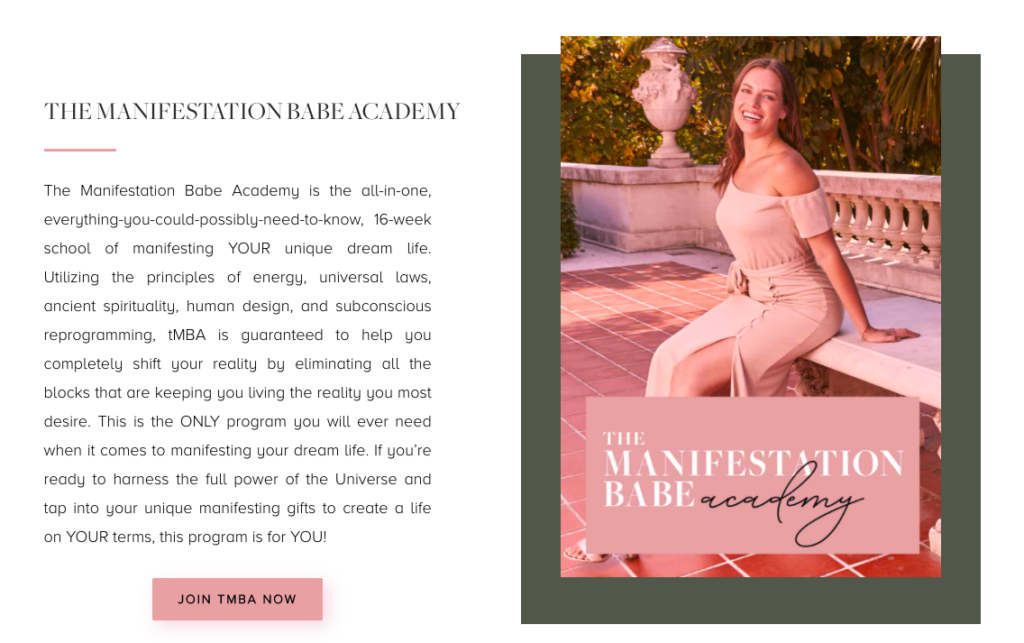
Kathrin Zenkina, also known as “Manifestation Babe” is a mindset coach who teaches all things manifestation. She offers a number of online courses.
Online course creators are often also coaches, strategists, and bloggers. It’s the easiest way to get your knowledge out there!
You can use platforms like Podia, Teachable, and Kajabi to film your expertise.
3. YouTuber
YouTube is one of the “OG” spots for edupreneurs. All you need is some recording equipment and a YouTube account to start selling your expertise.

The School of Life records and shares animated videos. Their mission is to spread free education on philosophical and self-development topics.
With millions of subscribers and paid sponsors, the creators behind this channel make a comfortable living.
You’ll often see famous YouTubers start personal brands and sell products. Michelle Phan, for example, posted makeup tutorials on YouTube and now owns Em Cosmetics, a makeup brand.

4. Strategist
You might be an expert in your field—which could be anything from accounting to teaching Spanish, for example. Rather than going the coaching route, you can become a strategist.
Strategists offer structure, guidance, and strategies to help people scale their businesses.

Kayleigh Moore is a freelance writing consultant. She uses her more than seven years of freelance writing experience to scale content marketers’ and freelancers’ businesses. Kayleigh offers writing services, but she also sells her expertise with consulting services.
Consulting is a great option if you’re not ready to make the full leap into coaching or strategy.
5. Affiliate marketer
Affiliate marketing is when you sponsor products using blog posts, videos, and email marketing. When someone clicks on your link and makes a purchase, you get a percentage of the profit. It makes the “make money while you sleep” dream a reality.
Niall Doherty is a business expert who sends a weekly newsletter in which he rounds up the best online courses and tips for building online businesses. These newsletters are PACKED with affiliate links.

In case you’re wondering how much affiliate marketers make, Niall cashes in over $20,000 a month from his weekly newsletter.
The best part about affiliate marketing? You don’t have to limit yourself. Coaches, YouTubers, and strategists often use affiliate marketing to make extra income.
6. Blogger
Blogging has taken off over the past few years. High-end companies, influencers, and everyday people own blogs. Heck, we at Interact own a blog, too!
And yes, you can make a killing with a blog.

Natalia Gomez spreads her passion for sustainable clothing with a blog. She teaches users how to make eco-friendly choices when it comes to shopping.
After just one year, Natalia increased her blog traffic to 80k followers!
Blogging is like YouTube, where it can start as a hobby but turn into a career. Once you build an audience, you can sell knowledge products using affiliate marketing. Or you could build online courses!
With all of these online platforms, selling your expertise isn’t as hard as you think.
How much do edupreneurs make?
Edupreneurs can make anywhere from $50k to over $300k a year. The average edupreneur scales their business to six figures. But let’s take a look at some of the edupreneurs’ incomes we mentioned above.
- Sahara Rose, Dharma Coach—six figures a year
- Kathrin Zenkina, Manifestation Babe—seven figures a year
- The School of Life, YouTube channel—$540,000 a year
- Kayleigh Moore, Freelance Strategist—six figures a year
- Niall Doherty, Affiliate Marketer—$27,000 a month
- Natalia Gomez—no income disclosed, however, bloggers like Making Sense of Cents make over $100,000 a month.
If you’re thinking that you’ll never make that much money as an entrepreneur, remember that all of these edupreneurs started from $0. And look how far they’ve come!
Not to mention, salary isn’t the only marker of success. The best part about edupreneurship is working fewer hours and doing what you love most. As you sell your expertise, consider:
- How much energy you’re willing to invest in your business
- Your income goals
- Your passions and how you’ll make money from them
Leaving your job for the edupreneur life
Leaving your career for knowledge commerce can be intimidating. You might think that you’ll never make it or tell yourself that your 9-to-5 is more secure than becoming an online creator.
So before we teach you how to become an edupreneur, let’s start with a pep talk. Edupreneurship is just as secure as a 9-to-5 job. This statement might not resonate with you, but hear me out.
Your edupreneur path might fail, but so can your job. Your employer can fire you at any moment. And I know you’re thinking that they’d never do that, but sometimes it’s out of their hands (Hello, COVID-19!)
Plus, selling expertise has no income cap. There is nothing stopping you from making as much money as you please.
Kaye Putnam shared her story: “I was probably at my max as an entry-level employee, making about $50k a year and scraping by as a professional. And I realized that I had the talents and the skills to add more value than that. I wasn’t going to be able to do that in either the corporate world or under this agency’s way. I needed to step out and offer my own services to people directly.”

You get to charge what your knowledge products are worth and find clients who believe in you. You are in charge.
Something else to consider is how much you like your current job. You might love it, but also you might hate it. If you agree with the latter, imagine how much your quality of life would improve if you did something you loved.
Jerried Williams was fired from his corporate job, which pushed him to start Big Majority. “By allowing myself the freedom to give my all to Big Majority, I’ve made massive gains in terms of the clarity and the ability to communicate what it is that I do.”

Remember, edupreneurship is using your natural gifts to help people do X. It’s not supposed to feel like trudging through sand. Selling knowledge online should feel natural.
And hey, if you’re insecure about leaving your job, remember that you can always find another one if all else fails. Stephanie Shaw shared her experience: “I really think that two solid years of trying to build a business is good. If I haven’t gotten it to where I need to go, if I haven’t exceeded previous income, and haven’t been able to bring in some teams, then I need to call it quits.”
Give yourself a deadline to pursue your passion. If a year or two passes, and nothing? Go back to the drawing board and try again.
Plus, you don’t have to leave your job right away. You can always sell knowledge products as a side-gig until you make enough to comfortably say I’m outta here!
How to become an edupreneur?
If you’ve made it this far, you must be dying to know how to start selling your expertise. Below are eight steps to get your biz off of the ground and do what you love!
Table of contents
- 1. Choose your niche
- 2. Reframe limiting beliefs
- 3. Join an encouragement group
- 4. Get initial clients
- 5. Create content consistently
- 6. Sell your expertise
- 7. Charge what your work is worth
- 8. Automate your process
1. Choose your niche
Being an edupreneur sounds great and all… but how do you figure out what to sell?
The easy answer is to sell your expertise. But you might have multiple talents. Or, you may not realize your innate gifts.

Below are a few questions to help you discover your niche.
1. What could you spend hours learning more about? Why?
If you love something enough to spend hours doing it, you should probably look into it.
2. What did you love to do as a child?
As children, we chose activities because they were fun. Look back at your memories and list what made you joyful. This can be anything from joining Little League to playing “teacher” with your friends.
3. What do your friends always compliment you about?
Your natural talents are often what people admire most about you.
4. How do you best communicate with others?
Are you a talker? Listener? Doer? This answer will help you see how you best communicate with others.
5. If you could get paid for any of your hobbies, which would it be?
Simply answering this question will open up new possibilities.
You can also take our “What’s your magnetic marketing archetype?” quiz to figure out your natural business approach!

2. Reframe limiting beliefs
Beliefs are stories we tell ourselves about money, relationships, running a business, etc. You know the sayings, “Startups always fail” and “More money, more problems?” Those are beliefs.
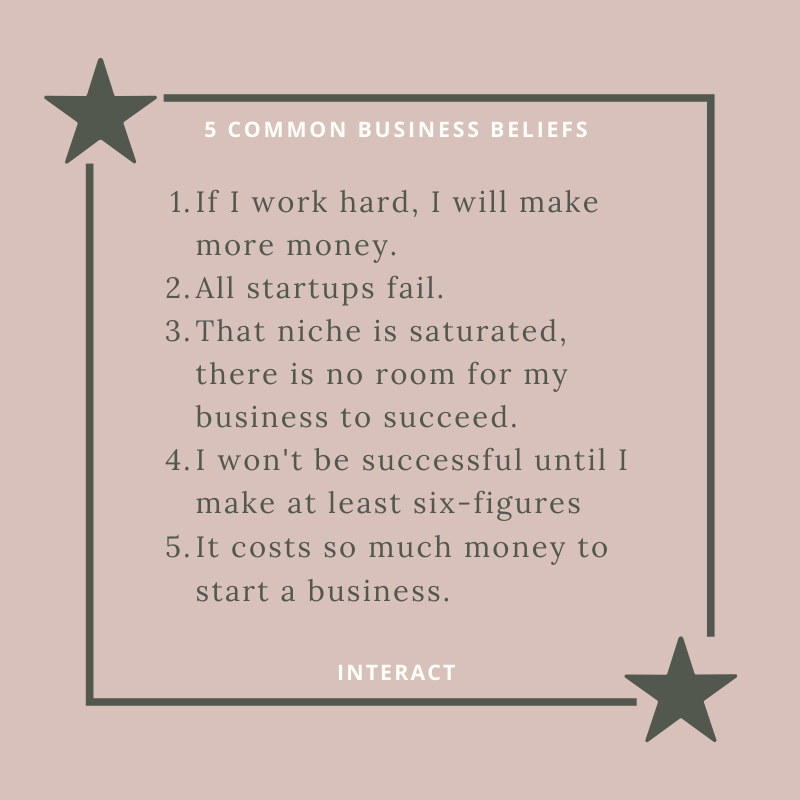
Everyone stores beliefs in their subconscious mind, which shapes daily decisions. These beliefs become problems when they hinder your success.
Let’s go back to the “More money, more problems” belief. How do you expect to grow your income if you believe that more money causes problems?
Instead, you could reframe this belief to “More money, more options.” Options sound WAY better than problems, right? And it’s true! As your income increases, you’ll come across more options to diversify your finances and live the life you want.
The key is to reframe your limiting beliefs into expansive ones. This way, you can grow your edupreneur biz and sell more knowledge products.
Kelly Trach’s dream was to publish a book, but people told her she wouldn’t be successful with a low number of followers. Rather than following this belief, she pitched over two hundred publishers and made it happen.
“When it comes to certain mindsets, I actively choose not to believe a lot of things. So when people told me I couldn’t get a book deal with a small audience, I decided not to take on that belief.”
To reframe your beliefs around selling your knowledge, list 10 to 15 thoughts you have around business. Then reframe them into empowering beliefs.
Below are a few examples.
- Nobody is going to care about my business. → The right audience will LOVE my services.
- There’s no way I can run a biz when I’m raising a family! → I can communicate with my partner or loved ones and make a plan.
- Growing a business is SO expensive. → People start from the bottom all the time! There must be a way to grow a business without a hefty budget. I’ll reach out to fellow edupreneurs and see what I find.
Now that you’ve busted your limiting beliefs, you have nothing to lose!
3. Join an encouragement group
As you start a knowledge commerce biz, you’ll come across questions like:
- How do I find clients?
- Should I use Facebook ads or Instagram ads?
- How do I create an online course?
Enter: encouragement groups. Encouragement groups can work in person or online. In these groups, you’ll share advice, questions, and support.

Mai-Kee Tsang joined a mentorship, which turned into an internship opportunity. “I worked under a mentor for a year, but then I became his intern four months into it. I saw what it looked like to be behind the scenes… Watching a business go from zero to six-figures.”
You can find encouragement groups through:
- Meetup: Meetup is a space to advertise in-person groups in your local area. You can download the app and see what’s available.
- Slack: People in online groups feel like coworkers because you can talk to them throughout your workday. Here is a list of Business Slack groups you can join.
- Facebook groups: Similar to Slack groups, but on Facebook! At the search bar, look for groups similar to your edupreneur niche. “Blogging as a business” or “Online coaching business” are two examples.
- Mentorships: Some successful edupreneurs will build mentorships to share their knowledge with beginners. Kelly Trach’s mentorship includes monthly Q&As, masterclasses, and 1:1 feedback sessions.
4. Get initial clients
There’s no better feeling than landing your first client. Someone is taking a chance on your knowledge!
But how do you find your first clients?
One, use your connections and reach out to friends and family. Who knows, your cousin’s friend might be interested in your knowledge products!
Second, connect with your audience on social media. Share your expertise with posts, stories, and live videos.
If you’re wondering which social media channel to use, try one or two at a time. For example, try Instagram and Twitter for two months, and if you’re struggling with traction, try YouTube and Facebook, and so on.
Third, build an email list. An email list sends your content, promos, and discounts straight to your user’s inbox. It’s hard to forget about a business with consistent emails.
Last, use PPC ads to reach out to new users. Creative entrepreneurs find success with Facebook ads, Instagram ads, and Pinterest.
5. Create content consistently
I don’t know about you, but I always research before making a purchase. I read blog posts, watch videos, and search for social proof about the product.
I’m not the only one. Edelman found that 81% of customers need to trust a brand before buying anything from them.
Don’t expect a random person to buy your knowledge product without getting to know you first. You can speed up this process by building value and trust with content.
This means weekly emails, podcasts, YouTube videos… whatever works for you and your audience. Get it going.
Mai-kee Tsang, for example, hosts a weekly podcast to upkeep her values of encouraging women to get their voices heard.

Other forms of content you can use are:
- Newsletters
- Blog posts
- Videos
- Instagram/Twitter/Tik Toks
Try to engage with your online community at least once a week. If you’re on social media, increase your engagement to two to three times a week.
6. Sell your expertise
Selling your expertise means packaging your knowledge into a digital product.
Digital products include:
e-books: e-books are a nice addition to your other products. You can also transform your e-book to an audiobook, a blog post series, videos, etc.
Online courses: Use an online course platform like Teachable, Podia, or Kajabi to record your expertise with a course! This is best if you’re ready to record multiple modules of content.
Master classes: A master class is similar to an online course, but you only have to record one online class instead of multiple classes. Most master classes are one to two hours long.
Consulting: One-on-one coaching can be done over the phone or Zoom. Strategists and coaches use this route to guide clients to achieve X.
Mentorships: Mentorships are usually bundled digital products. For example, Paul Fishman’s “Self-love diet” mentorship includes:
- An online course
- Coaching calls
- A private community

Edupreneurs find success with online courses, but see what works best for your and your audience by trying out different digital products.
7. Charge what your work is worth (keep increasing prices)
When I started as a freelance writer, I would say yes to a potential client’s budget without batting an eye, only to realize later that I should have asked for more.
The scenario above is way too common. If you set your rates too low, you’ll only end up resentful, which is a disservice to your clients who expect your best self.
How do you charge fairly?
First, consider your business expenses, like monthly fees, taxes, and benefits (health insurance, vacation time, etc). If you forget about expenses, you’ll end up making less profit than you should.
Next, look at your knowledge product and ask yourself, What makes my product stand out? How are my customers getting value from me?
Kaye Putnam went into detail on the subject. “I want a business that’s making X amount of dollars per month per year. What problem is big enough for my clients that it’s worth them paying these kinds of fees? And also, what kinds of outcomes and experiences do I need to provide to them so that it’s that valuable, essentially?”

If you can’t answer these questions, go to your audience for feedback about your brand. Ask them what problems you solve and then create a product out of it.
You should also use testimonials and social proof to back your business up. Ask clients for a testimonial and post it on your site. If you run a community, take screenshots of your customer’s success and post them!
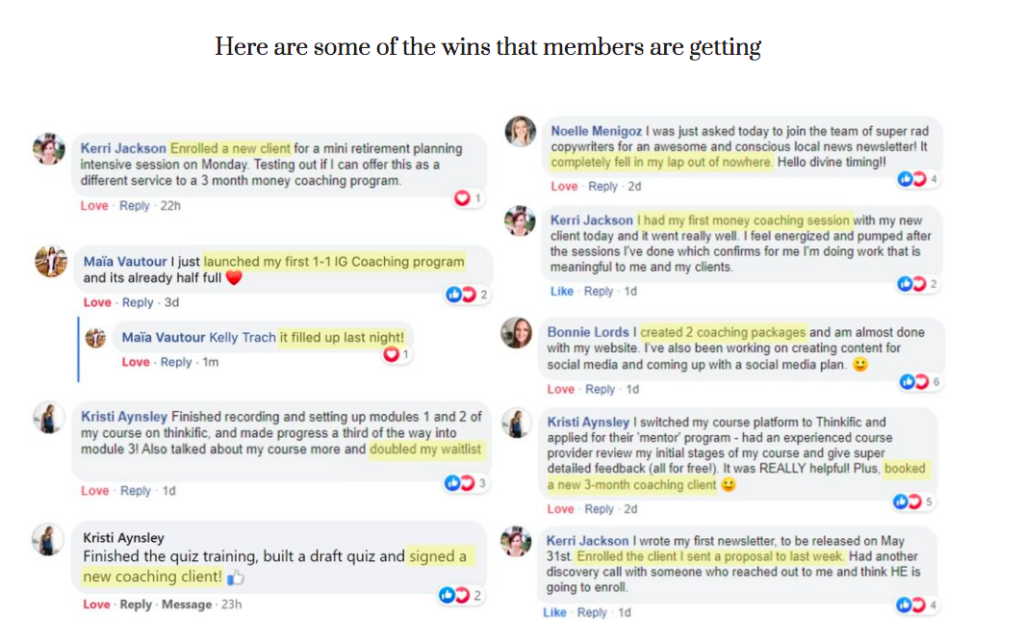
You can also turn to your encouragement groups and ask for support on pricing. In most cases, you’ll realize how much more you should be charging!
8. Automate your process
Running an edupreneur business, just like any business, you can find yourself working 40+ hour weeks… if you try and do everything yourself. You have a life outside of your knowledge commerce biz—don’t forget about it!
Stephanie Shaw touched on this: “If you’re starting a new business and don’t pause and take care of your mental health, you’re going to lose it.”
Rather than doing everything yourself, outsource and automate the tasks you either A) don’t care about or B) waste hours doing.
Your creation process is sacred as an edupreneur. Don’t waste it on mundane tasks.
We’ll start with outsourcing. Hire a virtual assistant to help you with marketing tasks, scheduling, invoicing, etc. And there are plenty of freelancers who would be happy to write your blog posts, video scripts, podcast transcriptions… you name it.
Now let’s talk about automation. As an edupreneur, you’ll need to automate your lead generation, email marketing, and day-to-day communication.
Lead generation: Keep your sales consistent with an automated lead generation tool. As soon as you create an Interact quiz, for example, you can leave it on autopilot to funnel leads to your email list!
Email marketing: Email software like ConvertKit or ActiveCampaign can automate email sequences. Check out our guide on how to use quizzes in your email marketing campaign.
Day-to-day communication: Look into email templates and contract templates (talk to lawyers for this one) to speed up communication. Another strategy is to block out a chunk of time every day to check emails, Slack groups, etc.
That’s it!
You’ve made it to the end! At this point, you know:
- What an edupreneur is and why you should become one
- 5 examples of successful edupreneurs
- 6 types of edupreneur jobs and their earning potential
- How to become an edupreneur
To make your edupreneur transition easier, check out our quizzes to generate leads on autopilot.
We live in a world where anyone can start a business from a laptop. Use this guide to turn your passion into a self-sustaining business.
It’s not easy, but it’s worth it. Wouldn’t you agree?
